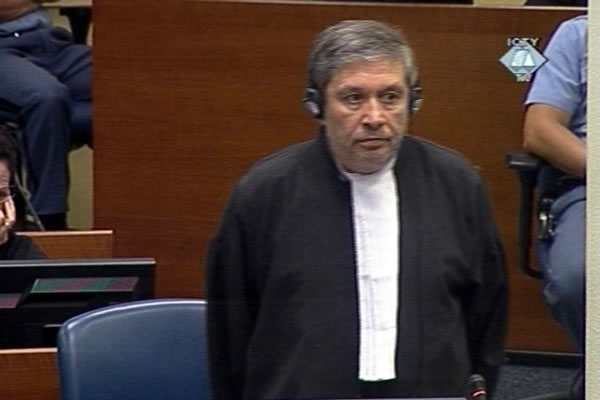Home
DEFENSE: NO GENOCIDE IN SREBRENICA
The defense case of the seven Bosnian Serb military and police officers charged with crimes in Srebrenica and Zepa in 1995 begins with the opening statement delivered by the defense counsel of the first accused Vujadin Popovic. Momcilo Krajisnik was then called as the first defense witness
 Zoran Zivanovic, defence attorney of Vujadin Popovic
Zoran Zivanovic, defence attorney of Vujadin Popovic According to the defense of Vujadin Popovic, former security chief in the VRS Drina Corps, there was no genocide in Srebrenica. There is no doubt that there were victims, but their number is still to be determined. Together with six other Bosnian Serb military and police officers Popovic is charged with crimes committed in Srebrenica and Zepa in the summer of 1995.
Apart from denying the genocide, in his opening statement Zoran Zivanovic, a Belgrade attorney, challenged Srebrenica’s status as a UN safe haven. Contrary to provisions of the March 1993 Security Council resolution, the Srebrenica enclave was never demilitarized, the defense contends. This resulted in some 6,000 armed members of the BH Army staying there. After two years of fighting those forces with no success, Popovic’s defense alleges, in the summer of 1995 the VRS launched a ‘completely legitimate’ operation Krivaja 95.
In the view of the defense, ‘the arrest’ of men suspected of being BH Army members in Potocari was also ‘legitimate’. Many BH Army soldiers who left Srebrenica in the wake of arrival of Mladic’s troops, Zivanovic said, ‘took their uniforms off and mingled with civilians’. Therefore, according to Zivanovic, the ‘accusations of separation of men from women and children’ in Potocari on 11 July and 12 July 1995 are absolutely unacceptable. Popovic’s defense counsel went on to allege that there was no intention to destroy all Muslims in the enclave. According to Zivanovic, that is clearly confirmed by the fact that ‘at the beginning, fire was not opened’ on the column of men who did not go to Potocari but instead headed towards Tuzla through the woods.
In order to substantiate his claims, the defense counsel showed parts from a US documentary, Yugoslavia: The Avoidable War. In the footage, leading figures from the international community at that time say that the Western powers are responsible for the outbreak of the war in the former Yugoslavia, coupled with the extremist moves of the then leadership of Croatia, Slovenia and BH. Contrary to that, the Bosnian Serb leadership ‘did everything to prevent the war’.
[IMAGE]3454[/IMAGE]According to the defense, one of the moves aimed at preventing the war was the formulation of ‘six strategic aims of the Serb nation in BH’ in May 1992. The prosecution sees this document as proof that the crime committed against Bosnian Muslims was planned in advance. To challenge this, Popovic’s defense counsel called Momcilo Krajisnik, former president of the Bosnian Serb Assembly, as his first witness. Krajisnik was sentenced to 27 years for the ethnic cleansing of Bosniaks and Croats in BH; his case is currently before the Appeals Chamber.
The strategic aims of the Bosnian Serbs, Krajisnik contends, resulted from the plan drafted by the international community to end the conflict in the former Yugoslavia. This plan was called after its author, Portuguese diplomat Cutilhero. On the other hand, the Bosnian Serb strategic aims were based on Alija Izetbegovic’s position that the BH borders with Serbia and Croatia must be ‘permeable’ to ensure unimpeded communication of Bosnian Croats and Bosnian Serbs with their respective ‘metropolis’.
The defense counsel noted in particular the third and the sixth strategic aim. According to them, ‘a corridor along the Drina River’ – dividing Serbia and BH – ‘should be established’ to ‘eliminate the river as a border between the two worlds’. Not only did those aims stem from Cutilhero’s plan, they were to be incorporated in the Dayton peace accords that ended the war in BH. As today’s hearing drew to a close, prosecutor Julian Nicholls started his cross-examination of the first witness.
Linked Reports
- Case : Popovic et al. - "Srebrenica"
- 2008-05-09 NEW PROSECUTION EVIDENCE AT SREBRENICA TRIAL
- 2008-03-03 NO CHANGES FOR SREBRENICA AND ZEPA CHARGES
- 2008-02-18 PROSECUTION: ‘SREBRENICA SEVEN’ GUILT IS PROVEN
- 2008-06-03 STRATEGIC GOALS WERE IMPLEMENTED ‘BY CHANCE’
- 2008-06-04 KARADZIC AND KRSTIC BEHIND THE ATTACK ON SREBRENICA
- 2008-06-16 NEW INTERPRETATION OF THE WORD ‘PARCELS’
